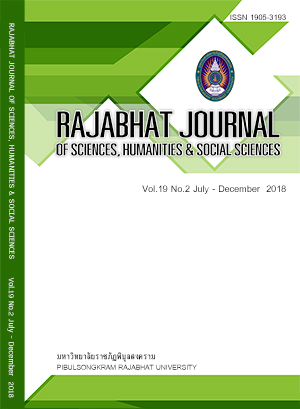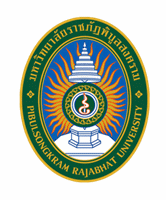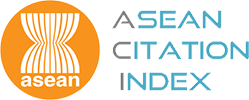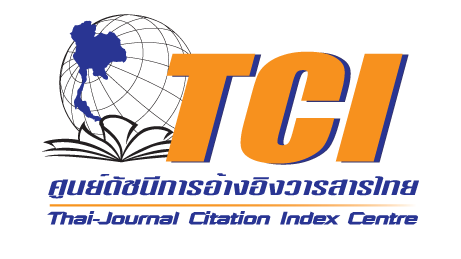ความสามารถในการเรียนรู้และกิจกรรมการเรียนรู้ตามแนวทฤษฎี พหุปัญญาของนักศึกษาชั้นปีที่ 1 วิทยาลัยนานาชาติ มหาวิทยาลัยราชภัฏสวนสุนันทา
คำสำคัญ:
multiple Intelligences, learning abilities, learning activities, teaching strategiesบทคัดย่อ
การวิจัยครั้งนี้มีวัตถุประสงค์เพื่อศึกษาความสามารถในการเรียนรู้ตามแนวทฤษฎีพหุปัญญา และเพื่อวิเคราะห์กิจกรรมการเรียนรู้ที่ส่งเสริมและพัฒนาความสามารถในการเรียนรู้ตามแนวทฤษฎีพหุปัญญาของนักศึกษาชั้นปีที่ 1 วิทยาลัยนานาชาติ มหาวิทยาลัยราชภัฏสวนสุนันทา กลุ่มตัวอย่างที่ใช้ในการวิจัยครั้งนี้ คือ นักศึกษาชั้นปีที่ 1 สาขาวิชาธุรกิจการบิน วิทยาลัยนานาชาติ มหาวิทยาลัยราชภัฏสวนสุนันทา จำนวน 240 คนเครื่องมือที่ใช้ในการวิจัยครั้งนี้ ได้แก่แบบสอบถามความสามารถในการเรียนรู้ตามแนวทฤษฎีพหุปัญญาของ Armstrong และเอกสาร งานวิจัยที่เกี่ยวข้อง วิเคราะห์ข้อมูลโดยการใช้สถิติในการหาค่าความถี่ ร้อยละค่าเฉลี่ยและส่วนเบี่ยงเบนมาตรฐานและวิเคราะห์ผลที่ได้จากการตอบแบบสอบถามของนักศึกษา และกิจกรรมการเรียนรู้ที่ส่งเสริมและพัฒนาความสามารถในการเรียนรู้ของนักศึกษาตามแนวทฤษฎีพหุปัญญา ผลการศึกษาพบว่า นักศึกษามีความสามารถในการเรียนรู้ตามแนวทฤษฎีพหุปัญญาในด้านการเข้าใจตนเองมากที่สุด รองลงมา คือ ด้านภาษา ด้านดนตรีด้านการเข้าใจธรรมชาติ ด้านมนุษยสัมพันธ์หรือการเข้าใจผู้อื่นด้านการเคลื่อนไหวร่างกายและกล้ามเนื้อ ด้านมิติสัมพันธ์และด้านตรรกศาสตร์หรือคณิตศาสตร์ตามลำดับ กิจกรรมการเรียนรู้ที่เหมาะกับความสามารถในการเรียนรู้ตามแนวทฤษฎีพหุปัญญาของนักศึกษาสามารถแบ่งเป็น 2 ลักษณะ ได้แก่กิจกรรมเพื่อส่งเสริมความสามารถในการเรียนรู้ตามแนวทฤษฎีพหุปัญญา ได้แก่ด้านการเข้าใจตนเอง ควรเน้นการคิดตรึกตรองเลือก คิดด้วยตนเอง ด้านภาษา เน้นการสื่อสาร แสดงความคิดโดยการใช้ภาษา ด้านดนตรีเน้นการใช้ดนตรีบูรณาการ และด้านการเข้าใจธรรมชาติเป็นการใช้ธรรมชาติเข้ามามีส่วนร่วม และกิจกรรมเพื่อพัฒนาความสามารถในการเรียนรู้ตามแนวทฤษฎีพหุปัญญา ได้แก่ ด้านมนุษยสัมพันธ์หรือการเข้าใจผู้อื่นเน้นการทำงานร่วมกับผู้อื่น ด้านการเคลื่อนไหวร่างกายและกล้ามเนื้อเน้นให้มีการเคลื่อนไหวร่างกาย ด้านมิติสัมพันธ์เน้นการใช้ภาพ สัญลักษณ์ สี และด้านตรรกศาสตร์หรือคณิตศาสตร์เน้นการคำนวณ จัดหมวดหมู่ และใช้เหตุผล
เอกสารอ้างอิง
Armstrong T. Multiple Intelligences in the Classroom. 3rd ed. Alexandria, VA: Association for Supervision and Curriculum Development, 2009.
Dachakupt P. 5C Skills for Developing Learning Units and Integrated Learning Manageme. Bangkok: Chulalongkorn University Press, 2007.
Dachakupt P, Yindeesuk P. Learning Management in the 21st Century. Bangkok: Chulalogkorn University Press, 2015.
Fry H. A Handbook for Teaching & Learning in Higher Education. London: Routledge, 2007.
Gardner H. Frames of Mind: The Theory of Multiple Intelligences. NY: Basic, 1983.
Gardner H. Multiple Intelligences New Horizons. United States of America: Basic Books, 2006.
Laddaklom S. The Study of Early Childhood’s Multiple Intelligence Abilities Obtained through Field Trip Study by Using the Multiple Intelligences Learning. Master of Education (Early Childhood Education), Graduate School, Srinakharinwirot University, 2008.
Light G, Cox R. Learning and Higher Education: The Reflective Professional. London: Sage, 2001.
Nolen JL. Multiple Intelligences in the Classroom. Education, 124, 131-142, 2003.
Raijaroen J. Effects of Using Multiple Intelligence Theory Activity in Mathematics Learning on Mathematical Connection Ability and Creative Thinking of Mathayomsuksa III Students. Master of Education (Secondary Education), Graduate School, Srinakharinwirot University, 2009.
Sanhachawee A. Multiple Intelligence in the Classroom, 2014. Bangkok: Department of Curriculum and Instruction Development, Ministry of Education. Available at: https://www.institute4learning.com/multipleintelligences.php. Accessed April 11, 2016.
Temnong C. The Result of an Management Plan to Support the Course according to the Theory of Multiple Intelligences that Enphasize on Vision and Spatial Intelligences to Increase of Elementary Student Prathomsuksa 3, Wt Huay Phai School, Ratchaburi Province. Master of Education (Research Teachnology and Curriculum Development), Graduate School, Rajamangala University of Technology Thanyaburi, 2014.
ดาวน์โหลด
เผยแพร่แล้ว
รูปแบบการอ้างอิง
ฉบับ
ประเภทบทความ
สัญญาอนุญาต
Each article is copyrighted © by its author(s) and is published under license from the author(s).










